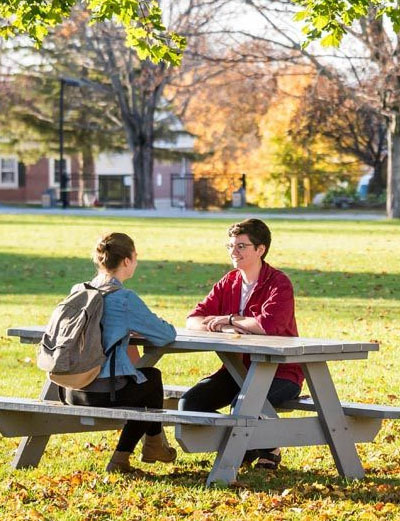Accessing Accommodations on Campus
At Colby-Sawyer College, one of the tools available for students to succeed is in the form of the Office of Access Resources. According to Director of Access Resources Katie Vedova, “Under the Americans with Disabilities Act, it’s a requirement that there are accommodations provided and, more so than accommodations, accessibility across campus. So that would be curriculum, services, activities across campus.”
Vedova is a graduate of Boston University. She studied journalism and French in her undergraduate program and earned a master’s degree in special education as well. One misconception she hears about the department is that they only work with testing accommodations. Vedova said, “We work with students in terms of accessing curriculum, accessing services, accessing facilities and programs. Some of the services we provide are as learning specialists. We meet with students weekly. We meet with students as a trusted adult who knows about their disability or mental health challenge — or it could be that temporary medical disability, if someone hurts themselves on campus and they need an accommodation for that. We’ll meet with them weekly at the beginning of each semester to decide accommodations within the classroom and then to meet each week to talk about how those are going, to plan, to organize.”
In addition to helping in the classroom, those within the department also talk about social and emotional things, such as how are classes going and how life on campus is going. Vedova said, “We’re also working with professional learners; some of the students we work with are online and then we would work with them through Zoom and providing accommodations and collaborating with their instructors. Access Resources also works with Baird Health and Counseling Center and the Student Learning Collaborative through referrals to provide students with mental health counseling and tutoring services if needed.”
Vedova believes the services provided through Access Resources help with student’s self-advocacy. She said, “Being a student who can talk to a learning specialist on a weekly basis or a student who has an accommodation to help bridge the gap and level the playing field, as we talk about it. It provides access, where they normally wouldn’t have access for that curriculum. Self-advocacy, self-resiliency, perseverance — all those things.”
Vedova hopes there will be more intentional conversations in the future about intersectionality involving campus members with disabilities and mental health challenges, with the goal of learning from each other. For Vedova, the most rewarding aspect of working with students is seeing their growth, how that affects them as an adult and how they bring those learning strategies, social strategies and emotional strategies with them into post-Colby-Sawyer life.
